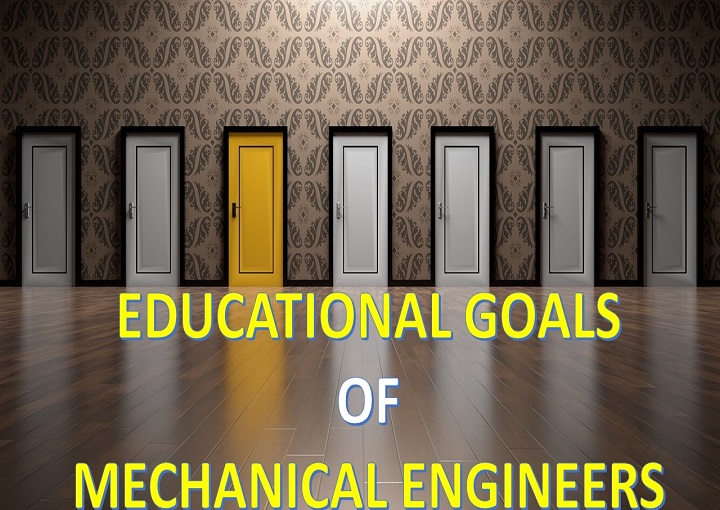Discover the educational goals of mechanical engineers and the key aspects that shape their academic journey. Explore the comprehensive skill set and knowledge base required to excel in this dynamic field. Uncover the core objectives of mechanical engineering education, including design proficiency, analytical thinking, and problem-solving abilities. Gain insights into the rigorous curriculum and practical experiences that equip aspiring engineers with the expertise to innovate and contribute to various industries. Embark on a quest to understand the educational goals that shape the future of mechanical engineering professionals.
Mechanical engineering is a dynamic field that encompasses various disciplines and industries. Aspiring mechanical engineers need to set educational goals to ensure a solid foundation in their chosen career path. In this article, we will explore the educational goals of mechanical engineers and the skills they aim to develop throughout their education.
Introduction
Educational goals refer to the objectives and outcomes that individuals strive to achieve through their education. For mechanical engineers, these goals encompass technical knowledge, problem-solving skills, communication abilities, professional development, ethical responsibilities, and leadership capabilities. By setting clear educational goals, mechanical engineers can navigate their academic journey and prepare themselves for a successful career in the field.
Technical knowledge and skills
One of the primary educational goals for mechanical engineers is to acquire a strong foundation in technical knowledge and skills. This involves studying core subjects such as mathematics, physics, and materials science. By understanding the fundamental principles underlying mechanical systems, engineers can design, analyze, and optimize various machines and structures. Additionally, practical skills such as computer-aided design (CAD), computer-aided manufacturing (CAM), and hands-on experience with machinery are crucial for implementing theoretical knowledge in real-world applications.
Specialization and expertise
Mechanical engineering offers a wide range of specialization options, including thermodynamics, robotics, automotive engineering, aerospace engineering, and more. As part of their educational goals, mechanical engineers often choose a specific area of focus to develop expertise in. Specialization allows engineers to delve deeper into their field of interest, gaining in-depth knowledge and skills that set them apart in the job market. Whether it’s designing energy-efficient systems or developing advanced manufacturing processes, specialization enhances the value and marketability of mechanical engineers.
Problem-solving and critical thinking
Problem-solving and critical thinking skills are integral to the educational goals of mechanical engineers. Engineering problems are often complex and require analytical thinking to identify the root cause and devise effective solutions. Through their education, mechanical engineers learn to apply scientific principles, mathematical models, and computational tools to analyze and solve problems. This ability to think critically and approach challenges from different perspectives is a valuable asset in the field.
Communication and teamwork
Effective communication and teamwork are essential skills for mechanical engineers. Engineering projects often involve multidisciplinary teams, requiring engineers to collaborate with professionals from various backgrounds. Mechanical engineers must be able to communicate their ideas clearly, both verbally and in writing, to ensure effective project coordination. Additionally, strong interpersonal skills foster teamwork, enabling engineers to work harmoniously with colleagues, clients, and stakeholders.
Professional development and lifelong learning
Mechanical engineering is a rapidly evolving field, with new technologies and advancements constantly emerging. As part of their educational goals, mechanical engineers strive for continuous professional development and lifelong learning. This involves staying updated with the latest industry trends, attending conferences and workshops, and pursuing
professional certifications or advanced degrees. By staying abreast of technological advancements and industry best practices, mechanical engineers can enhance their knowledge and skills, making them valuable assets in their respective fields.
Ethical and social responsibilities
Educational goals for mechanical engineers also encompass ethical and social responsibilities. Engineers have a crucial role in ensuring the safety, sustainability, and ethical considerations of their projects. They must adhere to professional codes of conduct, ethical guidelines, and regulatory standards. By incorporating ethical practices into their educational goals, mechanical engineers develop a strong sense of responsibility towards society and the environment.
Leadership and management skills
Mechanical engineers often progress into leadership roles, where they are responsible for leading teams, managing projects, and allocating resources effectively. As part of their educational goals, engineers aim to develop leadership and management skills. These skills include decision-making, problem-solving, delegation, and effective communication. By acquiring these skills, mechanical engineers can take on managerial positions and successfully lead engineering projects.
Conclusion
Setting educational goals is crucial for aspiring mechanical engineers to chart their path towards a successful career. Technical knowledge, specialization, problem-solving skills, communication abilities, professional development, ethical responsibilities, and leadership capabilities are among the key areas that mechanical engineers focus on during their education. By continuously striving to achieve these goals, mechanical engineers can position themselves as highly skilled professionals in the field.
FAQs (Frequently Asked Questions)
1. How long does it take to become a mechanical engineer?
Ans. The time to become a mechanical engineer typically ranges from four to five years, including a bachelor’s degree program.
2. Is it necessary to specialize in a particular field within mechanical engineering?
Ans. While not mandatory, specializing in a field of interest can enhance job prospects and expertise in a specific area.
3. What are some essential skills for mechanical engineers?
Ans. Key skills for mechanical engineers include technical knowledge, problem-solving, communication, teamwork, and leadership abilities.
4. What ethical considerations do mechanical engineers need to address?
Ans. Mechanical engineers must prioritize safety, sustainability, and ethical practices in their projects, ensuring responsible engineering.
5. How important is continuous learning for mechanical engineers?
Ans. Continuous learning is crucial for staying updated with technological advancements and industry trends, enhancing career growth and competitiveness.

